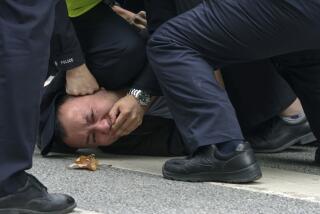Corrupt Officials’ ‘Escape Routes’ Alarm China
- Share via
BEIJING — As China’s leaders speed up a massive anti-corruption drive, it is becoming increasingly clear that they’re worried not just about graft draining state coffers or undermining their credibility, but also that corrupt officials will topple the Communist Party from within.
“This is a cruel dilemma,” says Minxin Pei, a China expert at the Carnegie Endowment for International Peace in Washington. “The regime is being undermined from within by its corrupt agents, but it cannot purge such agents ruthlessly because it also relies on them to maintain its rule.”
The problem the regime faces is evident in the age-old political practice of what Chinese call “liu hou lu,” roughly translatable as “leaving an escape route.” Today, it refers to corrupt officials’ preparations--premature, perhaps--for what they believe is the imminent collapse of the Communist regime.
Few observers believe that the government is about to crumble soon. Instead, the “escape route” phenomenon is a symptom of a deeper loss of faith in the future of communism, they say.
According to “National Disaster,” a recent book on corruption by Chinese Academy of Social Sciences sociologist Shao Daosheng, the cynical bureaucrats’ logic goes like this: “The Soviet Union’s and Eastern Europe’s yesterday is China’s tomorrow. China is already going [capitalist]--so all talk of Communist faith and the future of socialism is totally fake.
“This attitude is quite common among corrupt officials,” Shao asserts. “They hope the Communist Party will change its color, and the sooner the better.”
One common escape route involves obtaining foreign travel documents and moving assets, families and lovers overseas, to be rejoined as soon as the party-state disintegrates. Such corruption has contributed to capital flight estimated by the Bank of China at more than $20 billion annually.
China’s leaders are understandably alarmed. Expressing Beijing’s displeasure, an editorial in the Communist Party flagship People’s Daily aimed a thinly veiled critique at the phenomenon after the September execution of Cheng Kejie, a former vice chairman of the National People’s Congress.
“Some people, faced with the difficulties and problems that inevitably exist in the process of reform, do not stick out their chests and take responsibility but instead react passively or even look for a route of retreat,” it said.
According to state media, Cheng, through a Hong Kong intermediary, deposited nearly $5 million in bribes in a Hong Kong bank account for him and his mistress to use after leaving the mainland.
In recent months, numerous books have been published on the cases of Cheng and Hu Changqing, a former deputy governor of Jiangxi province. Both were executed last year in the highest-level corruption cases in half a century of Communist rule. Several of the books describe how Hu and Cheng prepared their respective escape routes.
One new book, “The Deputy Governor Who Walked Toward the Execution Grounds,” quotes Hu as telling his son, whom he had already sent to live in the U.S.: “You should try to get a green card so you can live there permanently--this way we’ll have someone to rely on when we move over there.”
Hu later told the official New China News Agency, “Aside from the formality of paying my monthly membership dues, I didn’t have the slightest concept of the Communist Party in my mind.”
Party officials’ wavering faith in communism is the main reason behind a slew of ideological campaigns in recent years, aimed at the party rank and file and bearing such arcane names as “the three stresses” and “the five spirits.”
In another version of the dynastic endgame, some corrupt officials are secretly assembling power bases of political allies in a bid to retain power in a post-Communist regime. The People’s Daily editorial warned of officials who, “in order to escape the oversight of the party and the people, carefully weave networks of connections, hidden social circles and double identities.”
In his book, sociologist Shao warns of parallels to the fall of the Soviet Union. He notes that a majority of top officials and industrialists in the government of Boris N. Yeltsin were former Communists who had contributed to and profited from the Soviet Union’s demise by stripping the state of its financial and political assets.
Some observers speculate that Chinese officials nabbed while preparing escape routes are punished less for their corruption than for their disloyalty to the party. The secretive nature of high-level politics in China leaves few clues as to how top leaders decide the fate of corrupt officials.
But such decisions are bound to reflect China’s centuries-old political culture, in which rulers commonly prized personal loyalty above professional ethics.
In this context, corrupt officials who bet on the regime’s collapse are seen not just as venal parasites but also as political turncoats.
Nevertheless, Chinese history is rich in examples of politicians creating exit routes for themselves. One of the best known is that of Meng Changjun, prime minister of the Kingdom of Qi in the 4th century BC. When Meng lost his job, his advisor got him reinstated, then lined up fallback jobs for him as the prince of Xue and as prime minister of the Kingdom of Liang. The advisor’s advice became an enduring proverb for political careerists: “The wily hare has three warrens.”
Despite official rhetoric to the contrary, prosecution of corrupt officials in China remains highly selective. According to the official Prosecutorial Daily, fewer than a third of officials found by prosecutors to have engaged in corruption are punished.
The conventional wisdom among Chinese citizens is that the only officials who fall to corruption probes are those who are defeated in political infighting or have lost the support of high-level patrons.
Observers can only speculate as to the extent of corruption at the apex of political power, such as in the Communist Party’s ruling Politburo, because China’s media seldom report on such cases.
Loyalists such as sociologist Shao insist that the party does intend to prosecute corrupt officials but that the vested interests of corruption are too deeply entrenched to be rooted out quickly or easily. “It’s not that they [corrupt officials] won’t get their comeuppance,” Shao says, “it’s just that the time hasn’t come yet.”
More to Read
Sign up for Essential California
The most important California stories and recommendations in your inbox every morning.
You may occasionally receive promotional content from the Los Angeles Times.













